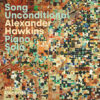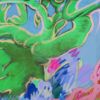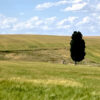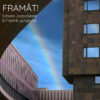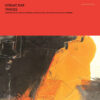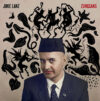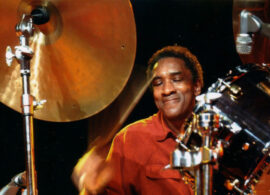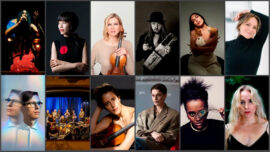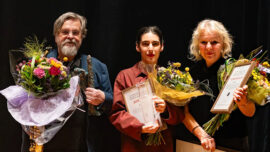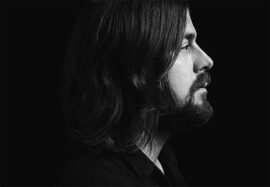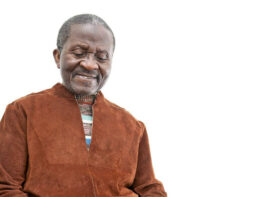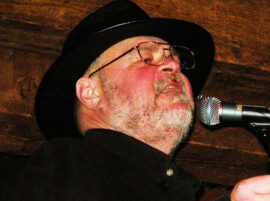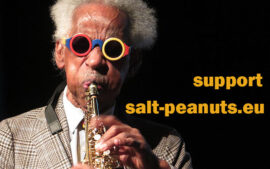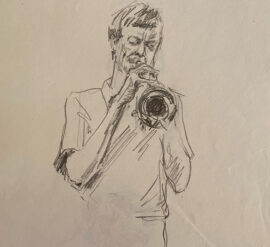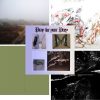
Italian, Brussels-based prolific pianist-composer-improviser Giovanni Di Domenico releases new albums almost on a weekly basis. He has developed an encyclopedic technique; rhythm, harmony and tone that are informed by non-western traditions yet equally sensitive to Debussy’s “Préludes”, Luciano Berio’s “Sequenzas”, to the ‘ambi-ideation’ heard in Borah Bergman’s Soul Note recordings, Cecil Taylor’s density, Paul Bley’s bruised transparency and of course, the most radical manifestations stemming from the underworld of pop music, invariably tied together by his own original praxis.
L’Occhio Del Vedere (The Eye of Seeing) is Di Domenico’s composition for fellow Italian violinist Silvia Tarozzi (who also plays 1/16th-tone violin, a member of the Dedalus Ensemble) and French percussionist Emmanuel Holterbach (who plays large frame drum). It was composed while Di Domenico was working on an artistic residency at the GMEA in Albi, France, in collaboration with Tarozzi and Holterbach in July 2022. Holterbach contributed the beautiful cover photography.
This hour-long composition has a minimalist, sparse and vulnerable «triptych» structure and plays with subtle, repeated melodic motifs that are interwoven into silent breaks, each time with slightly different textures, but in a perfect balance of tension and release, of consonance and dissonance. Holterbach’s almost inaudible vibrating touches of the large frame drum add an enigmatic drone layer to the organic and hypnotic interplay of Di Domenici and Tarozzi, as they keep ornamenting the melodic motifs with fluid, symmetric architectures, letting them resonate and linger long in mind. The delicate, ritualist spirit of this composition suggests a multidimensional expanse of space with a wide dynamic range and a mysterious atmosphere, as well as an elusive and mysterious sense of being an in-and-out familiar concept of time. A most beautiful and moving composition that reveals more of its secretive charms with each listening.
Pangrams documents the first-ever meeting between Di Domenico and the Norwegian accordion wizard Kalle Moberg, recorded at the empty club De Singer in Rijkevorsel in February 2021, a year into the dark turmoil of the Covid-19 pandemic, when the club activity was limited to online events. The two musicians encountered each other before when Moberg joined Di Domenico’s Mo(ve)ments Ensemble residency at the club, and their improvised confrontations sparked this spontaneous, improvised recording session.
Pangrams evokes a wide range of emotional moods, sketched in a chamber atmosphere. The four pieces stress the immediate and deep understanding of Di Domenico and Moberg. The opening piece “Gevoelige Geest” (sensitive spirit in Dutch) captures faithfully the contemplative yet gloomy, entrancing language of these kindred spirits; the following title piece introduces friction and tension to the interplay as Di Domenico and Moberg explore the full register of their instruments; “Secret Passion” sketches a beautiful and lyrical, folk-like melody; and the last piece, “The Concept Of Nothing” dives into melancholic, mysterious and highly captivating cinematic images.
Alinea offers a series of remote musical conversations between Serbian violinist and sound artist Manja Ristić and Di Domenico, recorded at various locations across Korčula island in Croatia and at Studio W in Brussels between May 2020 and February 2021. Still, the strong spiritual and mutual trust forged by their collaborations and playing together for many years now is felt throughout this album.
The album offers two suites, the three-part “Lune Di Giove” (Moons of Jupiter) and the four-part “Fantasmi Appiccicosi” (Sticky Ghosts). In both suites, Ristić and Di Domenico merge their distinct sound worlds fluidly. Di Domenico’s playing is quite reserved, anchoring each part with sometimes rhythmical, sometimes lyrical lines. Ristić’s violin playing, augmented with objects, electronics and field recording that introduce the sounds of everyday life and its surroundings, is more sound-oriented and free-associative. She expands the interplay with multiphonics that answer motivic calls, give new trajectories and propel it to move and to grow. Eventually, her sonic contributions put the music in a wider musical, conceptual and political context that invites us to meditate on the fragility of existence in the uncertain times of the pandemic that later gave away to yet another brutal war, as musicologist Ksenija Stevanović noted in her liner notes. Therefore, Alinea suggests a multidimensional interplay – between nature and urban soundscapes and Ristić’s violin, between their “ensemble” and Di Domenico’s piano, and between all of them at once, and offers a peaceful musical oasis that emphasizes, again, the importance of being with our loved ones, however far or close they are.
Rinka 燐火 (Phosphorus in Japanese) is a collaboration of Di Domenico and Japanese strings and synth player Atsuko Hatano. The two musicians first met 15 years ago but only in May 2019 they finally recorded a session at Di Domenico’s studio, The Nest Cellar in Brussels. After Hatano returned to Japan and only in 2021 he edited and dubbed this session with additional synths and strings at Studio Microbe in Hokuto. Rinka 燐火 offers three tender and mysterious, chamber and introspective soundscapes that juggle with minimalist, repetitive motifs. The last one, “After The Feast”, is the most impressive one and adds exotic, hypnotic touch to its unsettling and melancholic atmosphere.
The EP Pray For Your Prey offers a completely different atmosphere. It was recorded live on a rainy night in Brussels in October 2017 and features Di Domenico on the Fender Rhodes, Portuguese bassist Gonçalo Almeida, Hungarian drummer Balázs Pándi and Greek guitarist Giotis Damianidis. Here Di Domenico and his comrades flirt with a free improvised, raw, nervous and powerful blend of atmospheric soundscapes, noise, post-rock. metal and free jazz while building methodically the tension and exhausting their hyperactive energies all the way toward a few volcanic climaxes.
Eyal Hareuveni
Giovanni Di Domenico (p, Fender Rhodes), Silvia Tarozzi (vio, 1/16th of a tone tuned vio), Emmanuel Holterbach (large frame dr), Kalle Moberg (acc), Manja Ristić (vio, objects, elec, field rec), Atsuko Hatano (strings), Gonçalo Almeida (b), Balázs Pándi (dr), Giotis Damianidis (g)


